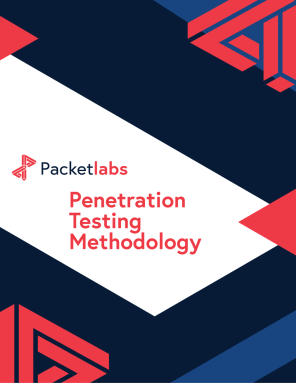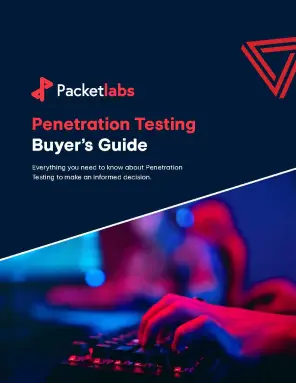Compliance
Guide to Penetration Testing for Compliance and Audits
Would you like to learn more?
Download our Guide to Penetration Testing to learn everything you need to know to successfully plan, scope and execute your penetration testing projects
When your organization is SOC 2, PCI DSS or ISO 27001 certified, you promote trust among your existing and prospective customers. Penetration testing, also referred to as ethical hacking or pentesting, is a powerful technique to ensure compliance with these renowned standards. Typically, penetration testing is a detailed assessment conducted on information systems to identify vulnerabilities that hackers can exploit.
A good penetration testing report gives adequate information for remedial efforts to mitigate the exposed risks swiftly.
Penetration testing for compliance is carried out to conform to certain well-known industry standards. When it comes to compliance, companies are required to perform a due diligence review on their IT security. Notably, each of these regulatory frameworks carries specific guidelines for penetration testing.
So what are the requirements for penetration testing compliance? This blog will help you understand the penetration testing requirements of the most common security standards.
Penetration Testing for SOC 2 Compliance
The American Institute of CPAs (AICPA) founded the Service Organization Control 2 (SOC 2) auditing procedure. The goal of the standard is to ensure adequate protection for your company’s customer data. SOC 2 carries a lot of value for commercial contracts, mainly for SaaS providers selling their solutions to large clients.
Businesses that use finances or accounting practices in their operations, facilitation or consulting must be SOC 2 compliant. Organizations that store, process and maintain customer information may need to be SOC 2 compliant.
One of the main requirements of SOC 2 compliance is that you need to use various ongoing and separate evaluations, this can include penetration testing as part of your internal audit assessments.
Penetration Testing for PCI Compliance
Payment Card Industry Security Standards Council (PCI DSS) results from a collaborative effort between Visa, Mastercard, American Express and others to prevent credit card fraud. Penetration testing is paramount for compliance with PCI DSS because it is the most reliable way at present to identify whether card-processing systems are properly secured or not.
Credit card companies require PCI compliance to make online transactions secure and protect them against identity theft. Any merchant that wants to process, store, or transmit credit card data must be PCI compliant.
The Security Standards Council provides detailed information for organizations planning to conduct PCI DSS penetration testing. It distinguishes between penetration testing and vulnerability assessment. It also describes the components you should target, such as internal networks, external networks and applications.
Penetration Testing for ISO 27001 Compliance
The ISO 27001 is one of the most adopted standards in a business partnership context; it has outlined a specific course of action for organizations to secure their assets. The standard has 114 controls to implement, making it a comprehensive framework.
ISO 27001 certification applies to any organization that wishes or is required to formalize and improve business processes around information security, privacy and securing its information assets.
As part of ISO 27001’s risk management process, every organization must use penetration tests to ensure that the implemented security controls are working as designed. Moreover, as you renew your ISO 27001 compliance, it will help you stay on top of the latest threats and vulnerabilities because you upgrade and add new safety features with every review.
Penetration Testing for GDPR Compliance
The General Data Protection Regulation (GDPR) framework is a set of legal guidelines issued by the European Union (EU). The GDPR framework protects citizens’ data from unauthorized use and gives them full power to manage their privacy.
Penetration testing is a crucial part of the GDPR compliance process because it helps organizations serving EU citizens verify and validate the security of their data processing systems. The standard also ensures that these organizations are compliant with the GDPR security guidelines.
By implementing a process for regularly testing, assessing, and evaluating the effectiveness of technical measures for ensuring the security of the processing, organizations can identify the possible ways in which their consumers’ data could be compromised. And performing a penetration is an ideal way to proactively promote practical solutions to address the issues while fully meeting the GDPR requirements.
How to Conduct Penetration Testing for Compliance?
Penetration testing plays an essential role in meeting the requirements of various well-accepted compliance standards. Penetration testing is widely accepted because it is among the most versatile cybersecurity assessments to validate and mitigate potential cyber risks.
Furthermore, the recommendations provided by a penetration test will help you secure mission-critical assets, which will eventually prevent financial losses and heavy fines for non-compliance.
Packetlabs is your trusted penetration-testing partner because we tailor our services to your organization’s chosen compliance standards and execute only the associated penetration tests, which makes our services quick and affordable. At Packetlabs, we have been helping several organizations in Canada for years through our penetration testing service.
With the help of our multi-phase penetration testing services, we examine various issues, such as network security, client-side protection, system configuration, authentication, database security, cryptography, web application security, e-mail phishing, OS and third-party patching, and so on.
Talk to us to further explore our affordable penetration testing for compliance and take the first step towards safeguarding your data, systems, networks, people and the entire organization.
Let's Connect
Share your details, and a member of our team will be in touch soon.
Interested in Pentesting?

Penetration Testing Methodology
Our Penetration Security Testing methodology is derived from the SANS Pentest Methodology, the MITRE ATT&CK framework, and the NIST SP800-115 to uncover security gaps.
Download Methodology
Penetration Testing Buyer's Guide
Download our buyer’s guide to learn everything you need to know to successfully plan, scope and execute your penetration testing projects.
Download GuideFeatured Posts

April 10 - Blog
Tactics for Jailbreaking LLMs
LLM security risks grow with advanced jailbreak techniques like Many-shot, Deceptive Delight, and PAIR. Discover how attackers bypass AI safety measures and how to mitigate these emerging threats.

February 04 - Blog
Blackwood APT Uses AiTM Attacks to Target Software Updates
Blackwood APT uses AiTM attacks that are set to target software updates. Is your organization prepared? Learn more in today's blog.

December 25 - Blog
Packetlabs: One of the Top 5 Best Penetration Testing Companies
It's official: Packetlabs has been recognized as one of the top penetration testing companies in 2024 on review platform Clutch.

- Toronto | HQ
- 401 Bay Street, Suite 1600
- Toronto, Ontario, Canada
- M5H 2Y4
- San Francisco | HQ
- 580 California Street, 12th floor
- San Francisco, CA, USA
- 94104
© 2024 Packetlabs. All rights reserved.






